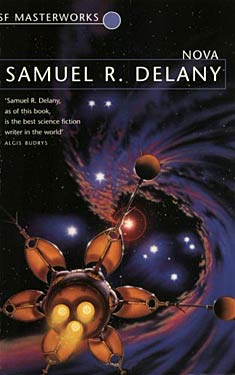Samuel R. Delany
Completed 8/30/2015, Reviewed 9/1/2015
4 stars
“Nova” is a very complex little novel. Part space opera, quest, political statement,
and philosophical reflection, it’s also considered a forerunner of the
nanotechnology sub-genre. This is only
my second novel of Delany’s and I found it quite gripping. At times the hard SF left me a little dazed,
as well as the changing points of view, but the brevity of the book and the tight
prose kept me from being lost for too long.
 My previous Delany work was his massive play with form,
“Dhalgren”, which came a few years later.
I regularly found foreshadowing of the later work in various passages here,
sometimes with the playing with form, and sometimes when the characters were
having philosophical conversations. In
fact, there’s a “form surprise” at the end of the novel which actually made me
laugh. There are other similarities as
well, like the character with one shoe.
But it didn’t distract me; it just gave me a feeling of
familiarity.
My previous Delany work was his massive play with form,
“Dhalgren”, which came a few years later.
I regularly found foreshadowing of the later work in various passages here,
sometimes with the playing with form, and sometimes when the characters were
having philosophical conversations. In
fact, there’s a “form surprise” at the end of the novel which actually made me
laugh. There are other similarities as
well, like the character with one shoe.
But it didn’t distract me; it just gave me a feeling of
familiarity.
This book is about a spaceship captain from a powerful
family who wants to fly into a star that goes nova and retrieve seven tons of
Illyrion, which is very rare and is used to power spaceships and make hostile
planets habitable. His reason for doing
this is for a vendetta against another powerful family whose control of the
market and most of the galaxy would be destroyed by the massive influx of
Illyrion into the market. Captain Von
Ray assembles a diverse and bizarre crew for this venture, travelling from planet
to planet looking for clues to a star ready to blow.
Delany makes a lot of points in this book. He grandly plays with diversity with the
captain and other characters being bi- or multi-racial, a set of black twins
where one is an albino, and a gypsy. He
also uses a special syntax for the characters from one part of the galaxy. It’s tough reading at first, but is fun at
the same time. For the nanotechnology,
people are given implants at an early age with which they can work and learn
better and can then achieve a greater sense of job satisfaction. At the same time, the tarot is accepted as
fact and disbelievers are tantamount to flat-earthers. One of the characters is writing a novel, a
dead art form, and he gets to expound on art and culture with his
crewmates. It’s just amazing that Delany
could pack so much into such a short novel and still keep it exciting.
The characters are very well developed. While the book begins with the gypsy, known
as the Mouse, we get the most background on the captain when we hear the
history of the vendetta. But the Mouse
is intriguing, particularly because he can play the syrinx, an instrument that
creates visual and olfactory stimuli in addition to playing music. It makes Mouse beloved by many minor characters
as well as by the reader.
This book was quite a ride for only being about 220
pages. As you can probably tell from how
much I jump from item to item in the review, there’s a lot to take in. In fact, it’s maybe a little too much, which
is perhaps why “Dhalgren”, his next major work, came seven years later and
filled nearly 900 pages. I give “Nova”
four stars out of five.
No comments:
Post a Comment